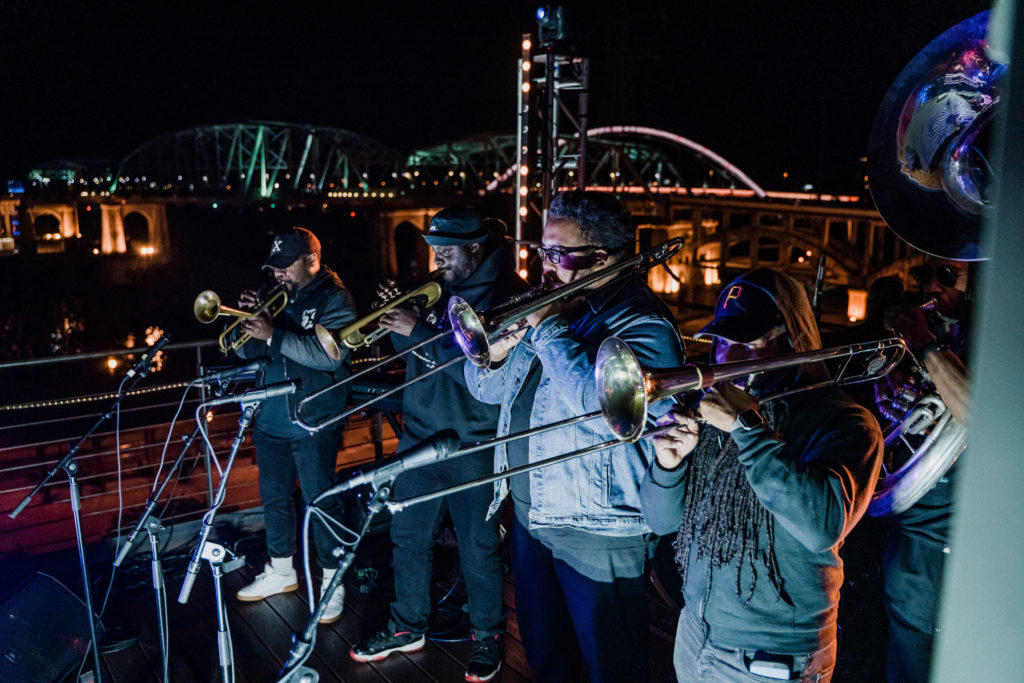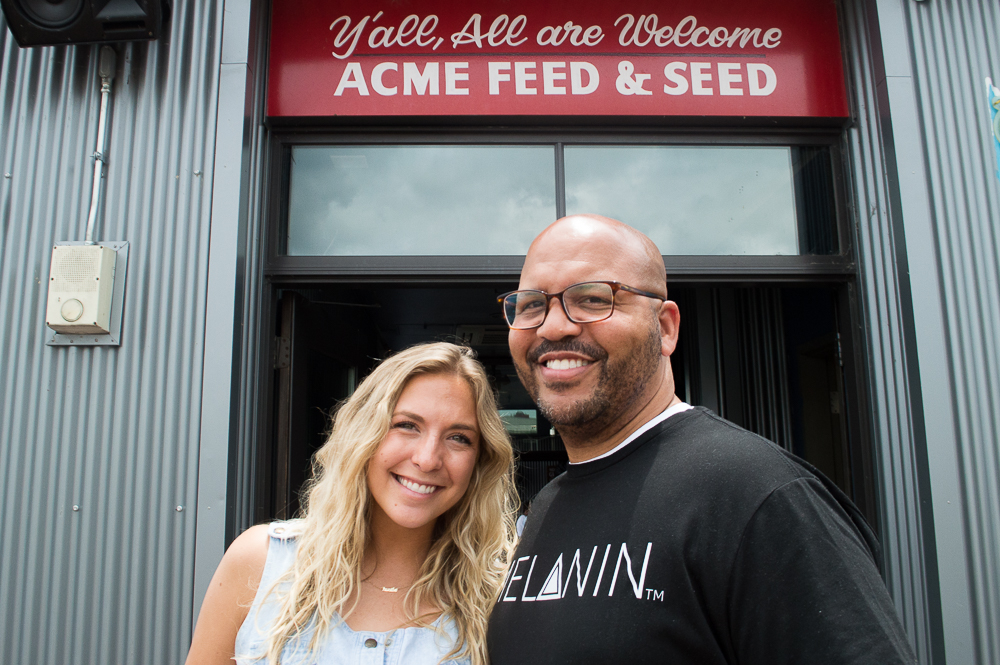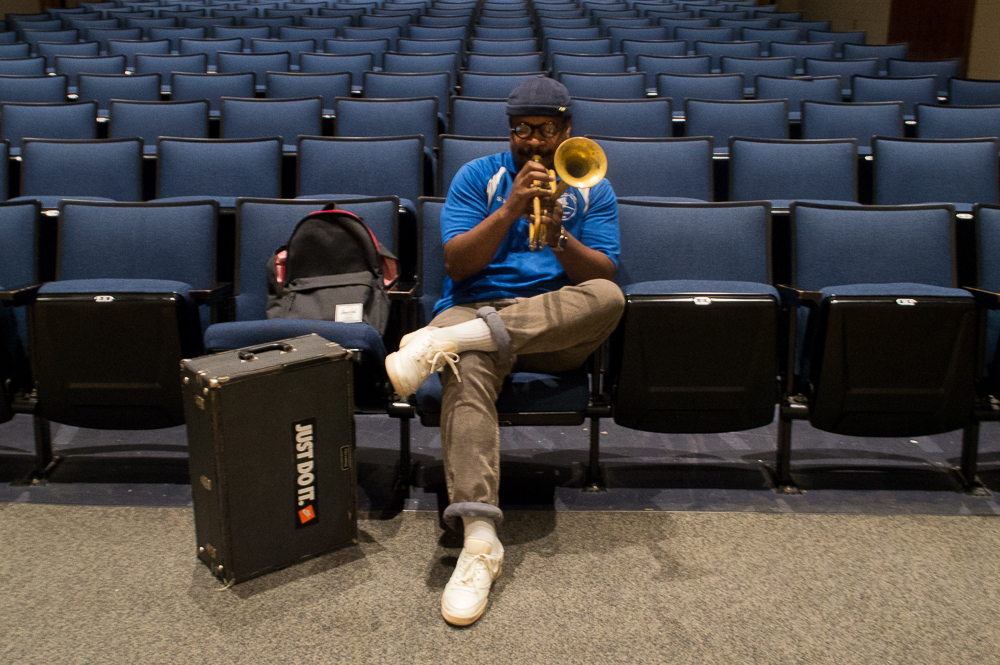
Acme Feed and Seed’s rooftop towers over people milling around Lower Broadway in cowboy hats and bridal sashes. On a recent May evening, the sun is setting behind musician Sarina-Joi as she thanks the venue for making space for Black musicians like her.
Her thank you pulls back the curtain on a tension in Nashville.
“I’m glad for what they’re doing because they’re trying to shine a light on a part of Nashville that doesn’t really get talked about a lot,” she says, guitar in hand. “Because we’re here, and we’ve got music and stuff, and people just don’t want to hire us. But Acme has always been a place where you can hear diverse music.”
This show is part of The Change Up, a series at Acme that is trying to diversify what live music looks like on Lower Broadway. The street has not historically been an inviting place for the city’s Black musicians, especially not hip hop, rap or R&B artists.
Acme’s Carson Bedenbaugh says many of their neighbors on Lower Broadway think that the city’s predominantly white tourists don’t have an appetite for that kind of music.
“My biggest goal with this is to show the rest of Broad, and to show the rest of Nashville, that this is not only something we should be doing in including diversity but also, it is profitable,” Bedenbaugh says. “It is something that people want in this city.”
On the street outside, tourists pass by on peddle taverns blasting hip hop and rap, further proving her point.
 Paige Pfleger WPLN News
Paige Pfleger WPLN NewsAcme’s Carson Bedenbaugh and Eric Holt of Lovenoise help shine light on Nashville’s diverse artists through their event, The Change Up.
Eric Holt is the mind behind The Change Up at Acme, but he’s been doing this work for a lot longer — his promotion company Lovenoise has been pushing for more space for Nashville’s Black musicians since the early 2000s. (Holt is also on the board of Nashville Public Radio.)
“We created the company as a platform for Black music because at that time, Black music in Nashville really did not have a stage,” Holt says.
So Lovenoise sought out that stage. They started by putting on hip hop shows at Second Avenue’s B.B. King’s Blues Club on Sunday nights. The shows were selling out, he says, but when they wanted to expand…
“There was nowhere else on Lower Broad that we had a place to do it in, and even B.B. King’s, even though it’s a blues place, wouldn’t let us do hip hop shows necessarily on Fridays and Saturdays, like on prime nights,” he says.
He’s seen some progress on Lower Broadway since then. The street is now bookended by spaces for Black artists, with Acme on one end and the new Fifth and Broadway development on the other, with Slim and Husky’s Pizza Beeria and the new National Museum of African American Music.
But he also calls himself the “realest realist” — and says Nashville’s music industry still has a long way to go.
“The highest level of participation within that industry is to own a live music venue,” Holt says. “There are zero Black-owned live music venues in this city. Not just Lower Broad — in the city, period.”
He says if he were to try open his own venue, he’d look to a different part of the city altogether: North Nashville.
That’s where historically Black music thrived. It’s where famous artists would snag student musicians for their backing bands. It’s where people spilled out of packed Jefferson Street clubs. And it’s where Fisk’s Jubilee Singers earned Nashville the “Music City” moniker.
But that history is often eclipsed by the massive money-making machine of country music and culture, says trumpet player and professor Larry Jenkins.
“It’s more cowboy hat and boot than anything else,” Jenkins says. “And that doesn’t represent the entire picture of what Nashville’s music scene is. There’s so much more.”
 Paige Pfleger WPLN News
Paige Pfleger WPLN NewsLarry Jenkins is a music professor at TSU and a member of the brass band, Brassville.
Where Holt is a realist, Jenkins is more of an optimist. He’s a band professor at Tennessee State University, and he plays Lower Broad with the brass band, Brassville. He wants his students to be able to say they’ve played some of Nashville’s most popular stages, including Lower Broadway.
Places like Acme and the museum will pave the way, he says.
“They’re providing these opportunities for a culture shift — a paradigm shift — to happen in Nashville,” he says.
For him, the motivation for what he calls a “Black live music renaissance” goes beyond just getting Black artists on a lineup.
Lower Broadway is a cash cow. He says Black musicians deserve the chance to finally profit on the Music City brand.

